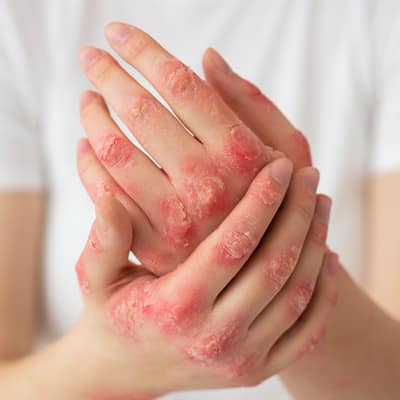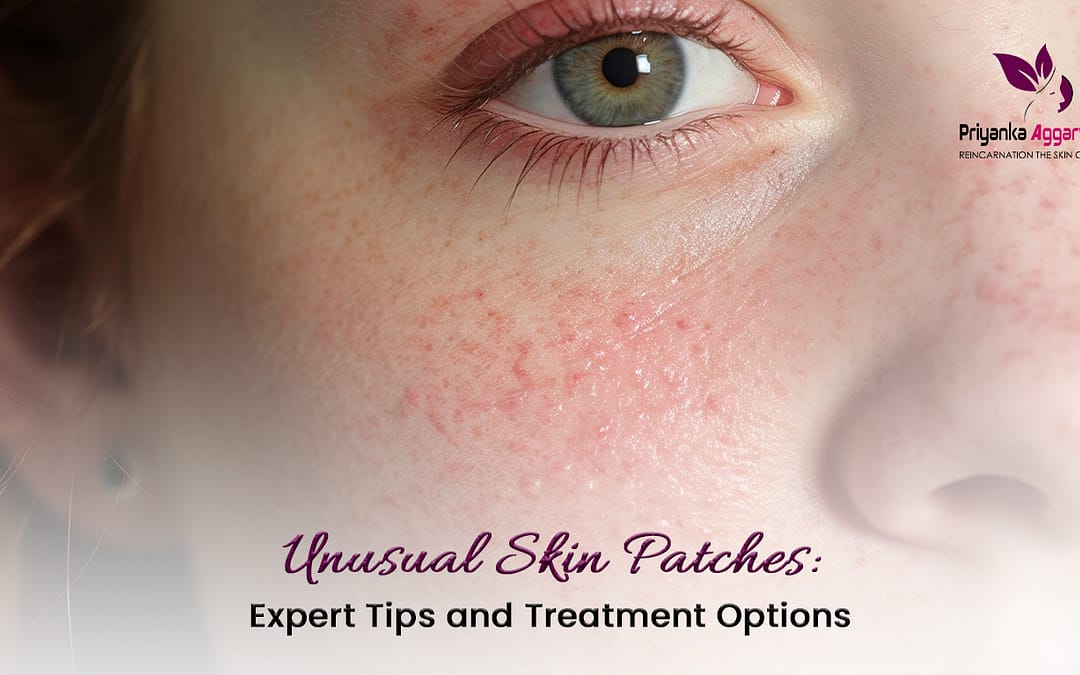Your skin is often a window into your internal health. Therefore, unusual skin Patches should not be ignored, as they may be a sign of a more serious underlying health issue that requires proper diagnosis and treatment.
This blog will discuss the causes of odd skin patches, their various forms, warning signs, and professional treatment recommendations from top dermatologists.
Table of Contents
What Are Unusual Skin Patches?
Skin disease symptoms vary significantly, depending on what condition you have. Skin changes are not always due to skin diseases. For example, you may get a blister from wearing ill-fitting shoes. However, when skin changes show up with no known cause, they may be linked to an underlying condition.
Causes of Unusual Skin Patches
The causes of unusual skin patches vary widely. Here are some common triggers:
1. Vitiligo: A condition in which melanin-producing cells are destroyed, causing the skin to lose its colour. White spots appear on various bodily areas as a result.
2. Fungal Infections: Fungal infections, or mycoses, are diseases caused by fungi that can affect the skin, nails, hair, or internal organs, with symptoms varying from itchy rashes and nail thickening to more severe issues like lung infections or blood infections in people with weakened immune systems.
3. Dermatitis or eczema: Eczema is a particular kind of dermatitis, which is a broad term for skin irritation. Atopic dermatitis is the most prevalent kind of eczema. While the terms “eczema” and “atopic dermatitis” are sometimes used interchangeably, it is crucial to recognize that eczema refers to a variety of disorders, the most common of which is atopic dermatitis. Prolonged inflammation causes dry, itchy, and scaly patches.

4. Psoriasis: Psoriasis is caused by an immune system malfunction where T-cells mistakenly attack healthy skin cells, leading to rapid skin cell production and a buildup of scaly, inflamed plaques, an autoimmune condition characterized by scaly, red, elevated areas.
5. Allergy Reactions: Discoloured patches may result from exposure to allergens, including foods, detergents, or cosmetics.
6. Sun Damage: Dark patches or spots may result from prolonged UV exposure. While the sun is necessary for vitamin D production, prolonged, unprotected exposure to UVA and UVB rays harms skin cells and connective tissues.
7. Nutritional Deficiencies: Common deficiencies include iron, vitamin B12, vitamin D, and calcium. Symptoms can range from fatigue and slow-healing wounds to more severe conditions like anemia and bone pain. Skin discoloration may be a sign of a vitamin and mineral deficiency.
Symptoms to Watch Out For:
Timely diagnosis and treatment can be facilitated by identifying early indicators.
The following are typical signs of vitiligo:
- Dark or pigmented areas;
- Red, swollen, or itchy spots
- White or pale patches
- Textures that are rough, dry, or scaled
- The affected skin becomes irritated or burned
- Discoloured areas gradually spread
- It is critical to see a dermatologist to rule out chronic problems if these symptoms continue.
Types of Skin Patches
Dermatologists classify unusual skin patches into different types depending on their appearance and cause:
- Hypopigmented Patches – Light-colored areas caused by conditions like vitiligo, pityriasis alba, or post-inflammatory hypopigmentation.
- Hyperpigmented Patches – Darker spots due to sun exposure, melasma, or scarring.
- Red or Inflamed Patches – Seen in eczema, psoriasis, or allergic reactions.
- Scaly or Rough Patches – Usually associated with fungal infections or dermatitis.
- Raised Patches – May indicate psoriasis, hives, or severe allergic responses.
Dermatologist-Recommended Treatment Options
Treatment for unusual skin patches depends on the underlying cause. Here are some top dermatologist-recommended options:
For Vitiligo
- Topical corticosteroids or calcineurin inhibitors to slow pigment loss.
- Phototherapy (PUVA or narrowband UVB) to stimulate pigmentation.
- Laser treatments for targeted areas.
- Camouflage makeup for cosmetic coverage.
For Fungal Infections
- Antifungal creams or oral medications are prescribed by a dermatologist.
- Proper hygiene and skin care to prevent recurrence.
For Eczema and Dermatitis
- Moisturizers and barrier creams to reduce dryness.
- Anti-inflammatory creams to manage itching and redness.
- Lifestyle changes, such as avoiding harsh soaps and allergens.
For Psoriasis
- Topical treatments like salicylic acid or vitamin D analogues.
- Phototherapy under medical supervision.
- Systemic medications are used in severe cases.
For Hyperpigmentation
- Chemical peels or microdermabrasion for an even tone.
- Topical creams with hydroquinone, retinoids, or Vitamin C.
- Sun protection with broad-spectrum sunscreen.
When to See a Dermatologist?
Since your skin is your body’s first line of defense, it is constantly exposed to stressors. Being the largest organ, it protects your organs, blood vessels, and nerves while shielding you from infections and water loss.
You should consider consulting a dermatologist if:
- The patches are spreading or multiplying.
- There is pain, itching, or bleeding.
- The skin texture changes significantly.
- You suspect vitiligo or another chronic condition.
If you notice these symptoms, it’s important to seek expert care. Dr. Priyanka Aggarwal at Reincarnation Skin Clinic, Kolkata, is widely regarded as one of the best dermatologists in Kolkata. With her modern treatment methods, specialized expertise, and personalized care, she helps patients effectively manage unusual skin conditions and restore their skin health.
Conclusion
Unusual skin patches should never be ignored, since they might signal underlying skin or health issues. From vitiligo and eczema to pigmentation issues, early diagnosis and proper treatment can help avoid problems and improve skin health.
If you notice or have been facing issues regarding abnormal skin patches, then consult Dr. Priyanka Aggarwal at Reincarnation Skin Clinic, Kolkata, known as one of the best dermatologists in Kolkata. Along with modern treatments and personalized as well as specialized care, you may regain healthy and unblemished skin.
Also read: Pregnancy-Safe Skincare: What to Use, What to Avoid, and Why It Matters
FAQ
Are unusual skin patches always a sign of vitiligo?
No. While vitiligo is a common cause of white skin patches, unusual patches can also result from fungal infections, eczema, or sun damage. Only a dermatologist can confirm the diagnosis.
Can unusual skin patches be treated permanently?
It depends on the cause. Some conditions, like fungal infections, can be cured completely, while chronic conditions like vitiligo or psoriasis can be managed effectively with the right treatment plan. Many skin conditions are chronic (long-lasting). Treatment can reduce symptoms, but you may need to continue medication or other treatments to keep symptoms at bay.
How can I prevent unusual skin patches?
Some skin diseases are not preventable. For example, there is no way to change your genetics or prevent an autoimmune disorder. You can reduce the risk by maintaining good hygiene, using sunscreen, eating a nutrient-rich diet, avoiding harsh chemicals, and visiting a dermatologist for regular checkups.

